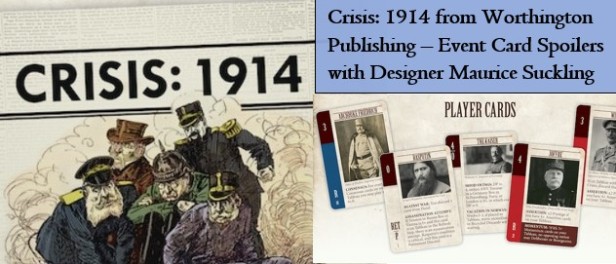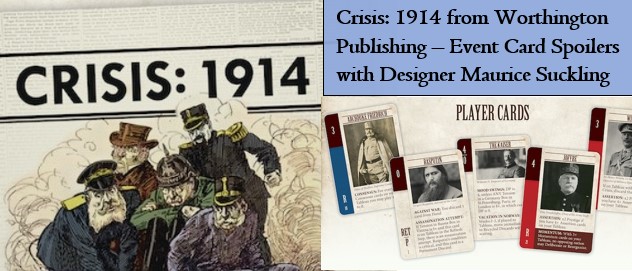We became acquainted with Maurice Suckling with his game Freeman’s Farm 1777 from Worthington Publishing in 2019 and really enjoyed the mechanics and how they all came together to create an interactive and interesting look at the Battle of Saratoga during the American Revolution. Since that time, Maurice has designed several other games that have went on to successful Kickstarter campaigns including Hidden Strike: American Revolution, Chancellorsville 1863 and 1565 Siege of Malta. He is now working on a game that is tied to the buildup of tensions that led to the outbreak of The Great War called Crisis: 1914 from Worthington Publishing, which was successfully funded on Kickstarter this past summer. He has prepared a series of Event Card Spoilers for the game and we are hosting them here on the blog. These posts will share the cards basis in history as well as how they are used in the game.

If you are interested in ordering Crisis: 1914, you can pre-order a copy for $65.00 from the Worthington Publishing website at the following link: https://www.worthingtonpublishing.com/collection/crisis-1914-pre-order-this-game-will-not-ship-until-february-2024

Card #1 – Summer Harvest Leave
Summer Harvest Leave was the annual period during which large parts of the Austro-Hungarian army were unavailable for war, so they could participate in collection of the harvest. Sean McMeekin tells us mobilization was only possible in the first week of the crisis, and then not again until later in July: five corps would return to active service by July 19, but the final two corps would not be able to follow until July 25. At that point, the issue would be resolved; a recall any sooner, as Gordon Martel points out, “would be regarded as preparatory to war” (McMeekin 2013, 115; Martel 2014, 122). Berchtold was obliged to work around the restrictions imposed by Harvest Leave.
The game does not permit an ultimatum to be issued in Week 1 – this has complications with pacing, and the objective in this game is not to cause war to break out at all – but it does permit the ultimatum as early as Week 3 (July 12-18) depending on what happens with The Kaiser’s Blank Cheque and, perhaps, on the player’s own decision-making.

Card #3 – Emperor Franz Joseph I
Emperor of Austria, King of Hungary
Nearly eighty-four at the time of the crisis and in poor health. The emperor was not especially fond of his nephew, the Archduke Franz Ferdinand, and was opposed to his marriage, which was morganatic (to make it clear just how opposed he was). He appears to have seen something of the hand of fate in their assassination – a condemnation of the unseemliness of the marriage and the three resulting children – and even forbade the couple’s burial in the Habsburg family vault. As he put it, “[…] one has not to defy the Almighty. In this manner a superior power has restored that order which I unfortunately was unable to maintain” (Margutti 1921, 147; Bestenreiner 2004, 247).
Although essentially an absolute monarch, Franz Joseph took a relative backseat during the crisis and left matters to Berchtold and the other ministers (Palmer 1994, 328). He adopted a pro-war stance after Germany made clear its support for Austria-Hungary and was grateful for this support, favoring concrete demands being put to Serbia (McMeekin 2013, 108; Martel 2014, 127). However, even after authorizing a general mobilization, he is said to have noted that “the breaking off of diplomatic relations does not necessarily mean war” (Martel 2014, 211).

Card #6 – Oskar Potiorek
Governor of Bosnia and Herzegovina
Present in the car with Archduke Ferdinand and Duchess Sophie, General Potiorek was the original target – or a potential secondary target – of the assassination attempt (Otte 2014, 17). He subsequently wasted little time before agitating for anti-Serb protests in Sarajevo on June 28 and 29 and quickly gained a reputation as one of the “fiercest hawks” in support of war (Spence and Nelson 1992, 313; Clark 2012, 394). Although Potiorek shared responsibility for the failed security measures with Minister Biliński, he does not seem to have openly acknowledged his culpability: instead, he “pressed for a rapid military strike against Belgrade” (Clark 2012, 394).

Card #7 – Count Tisza
Prime Minister of Hungary
By virtue of both his position and reputation, Count István Tisza wielded great power throughout the crisis – he was known “as a man of few words,” but those few words carried much weight in deliberations about Serbia (McMeekin 2013, 31). Tisza was himself far from a Serbophile, yet, according to Sean McMeekin, it was at least partly for this reason that he was initially one of the very few opposed to a declaration of war: For Tisza, “any enlargement of the [Austro-Hungarian] empire could only undermine Hungary’s privileged position within it, by bringing in yet more Slavic minorities” and thereby diluting the power of the slim Hungarian (Magyar) majority (McMeekin 2013, 32). This attitude made expedited action impossible early in the crisis (Otte 2014, 61-4).
Whether because he was worn down by the overwhelming chorus of pro-war voices, or the number of anti-Austrian attacks in the Serbian press, or the extent of the German support for Austria, Tisza switched his stance on July 14 and began to advocate an attack on Serbia. Even so, his reversal came with caveats for a diplomatic process that remained opposed by other members of the cabinet, as well as Germany itself (McMeekin 2013, 122-3). He also maintained that Serbian territory should not be annexed following the war – yet another unpopular opinion (Martel 2014, 148).
How the Berchtold (Austria-Hungary) player manages the Tisza card will be critical to a successful weathering of the crisis.
If you missed the previous entries in the series, you can catch up on the posts to date by following the below links:
Series Introduction and General Mobilization Cards
If you are interested, we posted an interview with the designer and you can read that at the following link: https://theplayersaid.com/2023/07/12/interview-with-maurice-suckling-designer-of-crisis-1914-from-worthington-publishing-currently-on-kickstarter/
-Grant
